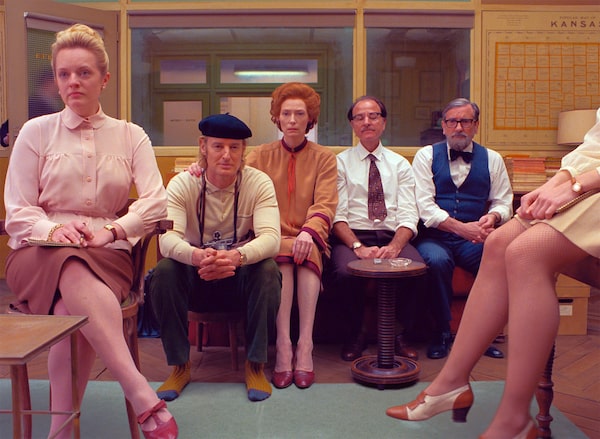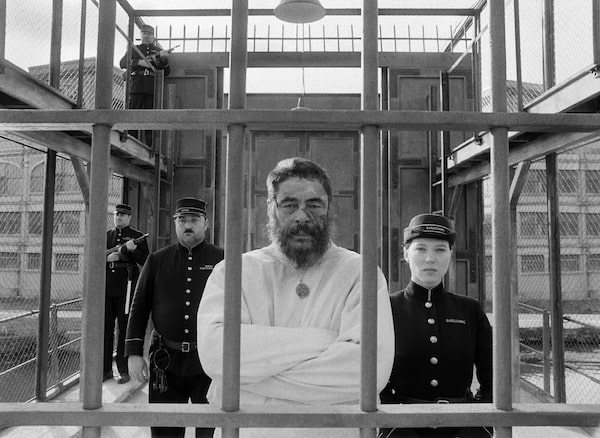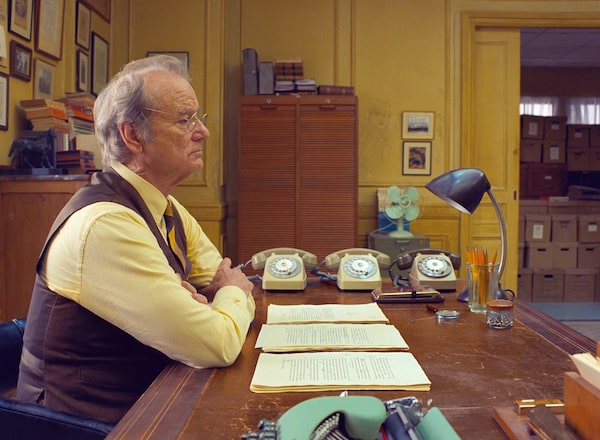
Left to right: Elisabeth Moss, Owen Wilson, Tilda Swinton, Fisher Stevens and Griffin Dunne in The French Dispatch.Twentieth Century Fox Film Corp. / Courtesy of Searchlight Pictures
Plan your screen time with the weekly What to Watch newsletter. Sign up today.
- The French Dispatch
- Written and directed by Wes Anderson
- Starring Jeffrey Wright, Frances McDormand and half of Hollywood
- Classification R; 108 minutes
- Opens in theatres Oct. 22
Critic’s pick
By this point in Wes Anderson’s perfect little-big Hollywood career – 10 films, five shorts and four commercials deep, to be precise – audiences are either firmly with the director or violently against him.
Thanks to a director who is extraordinarily confident in and comfortable with his sensibility, plus a cottage industry of parody videos and memes and movie reviews bursting with the words “twee,” “fanciful” and “Bill Murray,” we all know what a Wes Anderson film looks, sounds and feels like. But all of this universal Wes Anderson brand awareness doesn’t serve to discount the distinct and even surprising pleasures of his latest film, The French Dispatch.
And though the new comedy isn’t exactly a challenging proposition – though it will test one’s ability to distinguish between your cassoulets and your Chalamets – it does feel like a straight-ahead movie review is underserving its highly cozy but expertly curated ambitions. Herewith, a pop quiz/review/guide to the delightful but extremely specific Wes Anderson-y world of The French Dispatch.
1. The French Dispatch is:
a) an anthology film collecting “adaptations” of one obituary, one front-of-book piece and three long-form reported features that were published in the eponymous and fictional American magazine, based in the (also fictional) French town of Ennui-sur-Blasé
b) a love letter to a certain kind of highbrow, elite foreign-correspondent journalism practised by The New Yorker
c) an opportunity for Anderson to experiment, albeit in a highly calculated manner, with vignette storytelling
d) a reminder to contemporary working journalists that things were so much better before the internet and venture capitalism and expense-account oversight ruined everything

The film allows writer and director Wes Anderson to experiment with vignette storytelling.Twentieth Century Fox Film Corp. / Courtesy of Searchlight Pictures
2. The French Dispatch’s vignettes include:
a) a story focusing on an unscrupulous art dealer (Adrien Brody) who attempts to turn a convicted killer (Benicio Del Toro) into an art-world superstar, based very loosely on S.N. Behrman’s 1951 New Yorker feature “The Days of Duveen”
b) a story focusing on a student (Timothée Chalamet) who leads a protest against traditional French mores, based very, very loosely on Mavis Gallant’s 1968 New Yorker feature “The Events in May: A Paris Notebook”
c) a story focusing on a reporter (Jeffrey Wright) who gets caught up in the criminal plot to kidnap the son of a police captain (Mathieu Amalric), based not, so far as I can tell, on any New Yorker article – though it does feature a wonderful bit of hand-drawn animation that recalls a long-lost Tintin comic
d) a story focusing on the history of Ennui-sur-Blasé that features a bicycle-riding Owen Wilson, based on nothing more than Anderson’s and society’s collective desire to see Owen Wilson riding a bicycle
3. The French Dispatch looks:
a) whimsically beautiful, as if Anderson discovered a long-lost Antoine de Saint-Exupéry picture book
b) fantastically delightful, as if Anderson finally acknowledges that his cinematic worlds operate better as near-cartoon dreamscapes than flesh-and-blood realities
c) uneasingly fetishistic, as if Anderson has finally found the industry resources and good will to assemble all his many carefully cultivated visual obsessions into one uber-desirable, almost masturbatory vision board
d) très français, as if Anderson has watched Saturday Night Live’s recurring “Les Jeunes de Paris” skit over and over to the point at which reality and parody meld into one thick bowl of steamy vichyssoise
4. The performers are:
a) familiar Anderson acolytes like Tilda Swinton, Frances McDormand, Edward Norton, Saoirse Ronan, Liev Schreiber, Willem Dafoe, Jason Schwartzman, Amalric, Brody and Wilson, all of whom have perfected the required balance of deadpan irony and emotional fragility
b) new but eager Anderson players (Wright, Del Toro, Christoph Waltz) who feel right at home in the director’s unofficial rep company
c) new but eager Anderson players (Chalamet, Léa Seydoux) who might need another collaboration or two to figure out the filmmaker’s kinks, not to mention The Kinks
d) a true treasure-trove of hey-it’s-that-guy actors (Bob Balaban, Larry Pine, Fisher Stevens) who are each afforded about one line of dialogue, probably because Anderson simply likes hanging out with them in Europe, and who could blame him?

Bill Murray plays a character based on Harold Ross, the co-founder of The New Yorker.Twentieth Century Fox Film Corp. / Courtesy of Searchlight Pictures
5. Bill Murray plays:
a) The French Dispatch’s editor, a character based on Harold Ross, co-founder of The New Yorker
b) The French Dispatch’s editor, a character so effortlessly charming that he could only be played by Bill Murray
c) The French Dispatch’s editor, a character so enamoured by his writers and so disdainful of his magazine’s production staff, that he gave me, a one-time editorial production manager at a national news magazine that shall go unnamed, a screening-length bout of PTSD
d) … does it matter, really? It’s a Wes Anderson movie. Bill Murray is here. Isn’t that enough for you people?
ANSWERS: The answers to all of the above are all of the above.
In the interest of consistency across all critics’ reviews, The Globe has eliminated its star-rating system in film and theatre to align with coverage of music, books, visual arts and dance. Instead, works of excellence will be noted with a Critic’s Pick designation across all coverage.
 Barry Hertz
Barry Hertz